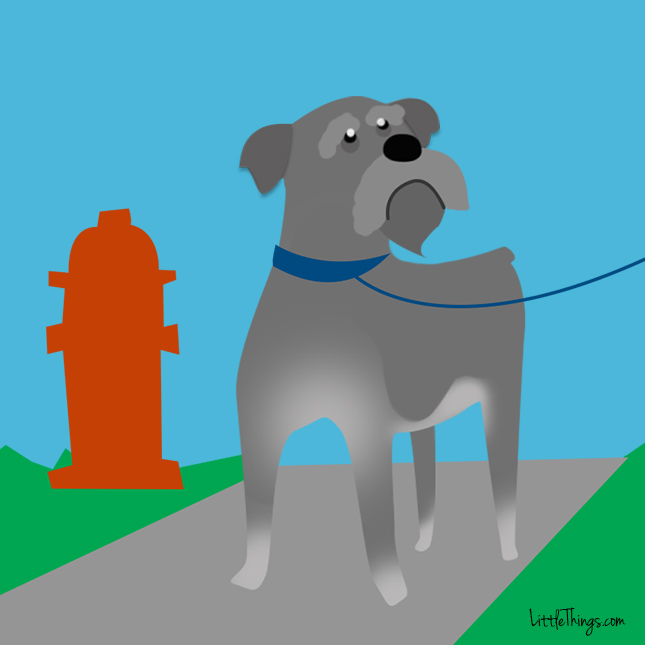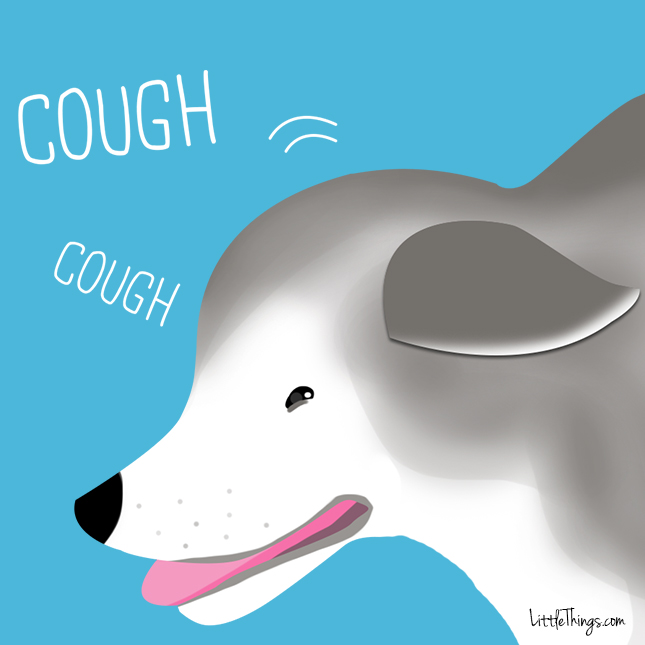According to the American Veterinary Medical Association, cancer is responsible for about 50% of deaths of pets over the age of 10. And for dogs specifically, cancer affects them at roughly the same rate as human beings.
Now when it comes to our own health, we are always on the lookout for cancer symptoms that we should never ignore. And when it comes to the health of our dogs, it is also our responsibility to be vigilant about any possible red flags in their health.
But how do we know what those red flags are? Veterinarian Dr. Phil Zeltzman writes, "Early detection is key when dealing with cancer, so learn to spot the signs."
This exclusive look at cancer symptoms in dogs shows you exactly what to keep an eye out for.
Like many dog owners, I know my dog well, so I know when something is wrong. But with cancer being so common in dogs, I want to make sure I know exactly what I'm looking for. Thank goodness I know this now!
Scroll through to see which dog cancer symptoms are a red flag indicating that your dog should be screened right away.
Right Thumbnail Photo: Flickr / Twinkle Enyong
Symptom #1: Weight Loss

Dr. Ann Hohenhaus writes, "Weight loss may be indicative of cancer or other significant health problems," and that it "should always prompt a discussion with your veterinarian."
Just like in people, your dog's unexplained weight loss could be caused by many serious health issues, including cancer. In general, your pet should be maintaining a normal weight unless you've put them on a diet.
So if you notice a big drop in weight, particularly in conjunction with other cancer symptoms, it is extremely important to bring your dog to a doctor right away.
Symptom #2: Declined Appetite

Dr. Karen Becker writes that you should watch out for "loss of appetite. Reluctance or refusal to eat is another possible sign of illness."
While at first you may just notice a little extra food in your dog's bowl, it is important to monitor if they truly have stopped or just slowed their eating. There are several types of cancers that cause a loss of appetite. A cancerous mass present in the intestines could be triggering stomach pains that make food unattractive to them.
If you notice this lack of appetite in your pet, you should definitely take them to the vet to be checked out.
Symptom #3: Disinterest or Lethargy

A sudden drop in your dog's interest level or a reluctance to be active should tell you that something is not quite right.
Dr. Gerald S. Post writes, "Unexplained lameness especially in large or giant breed dogs is a very common sign of bone cancer. Radiographs of the affected area are useful for detecting cancer of the bone."
Other possible explanations for your dog's disinterest could be nerve or muscle cancer. In any case, it is crucial that you take them to the vet right away, especially if this lethargy is accompanied by any of these other symptoms.
Symptom #4: Abnormal Swelling

When it comes to looking out for your dog's health, you have to keep an eye on any abnormalities on or under their skin. This abnormal swelling is a prominent symptom of doggie cancer.
Dr. Phil Zeltzman writes, "The most obvious sign is a mass (or bump, or lump) that keeps growing under the skin. Any surgeon will recommend that you don't just 'watch it,' but have it removed AND biopsied. If the mass turns out to be benign, that's great. If it is malignant or cancerous, then at least we know and we can discuss what to do next."
As with any illness, it is important to catch your dog's cancer early, so you should take them to the vet right away if you notice a lump.
Symptom #5: Bleeding, Discharge, or Wounds That Do Not Heal

In monitoring your dog's skin for lumps, you should also keep an eye out for any abnormal fluids or open wounds.
PetMD writes that any "abnormal substance being discharged from any part of your pet's body should be checked out by your veterinarian." They go on to write, "If your pet has wounds or sores that are not healing, it could be a sign of infection, skin disease, or even cancer."
Most normal wounds will heal themselves within a week or so. If you notice that your dog's injuries are not healing quickly, you should have them checked out by the vet right away.
Symptom #6: Bad Odor

Dr. Kelly Ryan writes, "While 'dog breath' is common, if you notice unusually foul odors coming from the mouth, nose or rectal area, it may be due to a tumor."
These tumors are quite common for different oral types of cancer. In order to perform a full oral exam, your dog will have to be sedated for a radiograph or CT scan.
In order for your dog to be properly screened, it is crucial that you bring them to the doctor as soon as you notice any kind of regular foul odor.
Symptom #7: Difficulty Eating or Swallowing

While loss of appetite is something to look out for, your dog may also want to eat but have trouble chewing or swallowing. This difficulty in eating could indicate a larger medical problem, like cancer.
Dr. Phil Zeltzman writes, "A lump in the neck could be putting pressure on the esophagus (the tube between the mouth and the stomach)."
Again, the only way to truly tell if your dog's eating difficulties are being caused by cancer is to have them screened by their doctor as soon as possible.
Symptom #8: Difficulty Urinating or Defecating

While it is not always the most pleasant part of being a dog owner, keeping an eye on your dog's bathroom habits is absolutely key to monitoring their health.
PetMD writes, "Changes in your pet's urinary or bowel habits – difficultly using the bathroom, frequent bathroom use, blood in urine or stool – these are all potential signs of cancer."
If you notice any of these problems regarding your dog's bathroom habits, particularly if they are accompanied by frequent vomiting, frequent diarrhea, bloating, or distention of the belly, you should take them to the vet right away.
Symptom #9: Frequent Coughing

Persistent coughing from your dog is never a good sign and could indicate a variety of health issues including cancer, heart disease, or lung disease.
Dr. Jake Zaidel writes, "If the dog coughs once or twice, it's of no concern, but if it continues to cough for more than a few days, that's a concern and could signal lung cancer."
In general, dogs are not supposed to cough, so this symptom in particular should be taken very seriously when deciding whether or not to get your dog checked out.
Symptom #10: Hiding or Behavior Changes

You know your dog better than anybody, so you certainly know when they are acting strangely. There is almost always an explanation for why your dog might suddenly be hiding from you or lashing out at you.
Dr. Kelly Ryan writes, "Has your dog been snapping more than usual? Are they spending more time away from you? They could be in pain. Also, pay attention to how they are walking, eating, and playing. If you notice any limping or struggling – it's time to see the vet."
Strange behavior from your dog is certainly one of the signs that something like cancer could be going on.
Keeping all of these symptoms in mind, and taking your dog to the vet when you detect something wrong, can be extremely effective in the early detection of cancer.
Please SHARE this vital information about early canine cancer detection with friends and family!




